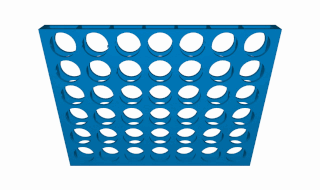Awesome

fiar
Four in a Row - A game to learn Erlang
Contact Us
If you find any bugs or have a problem while using this library, please open an issue in this repo (or a pull request :)).
And you can check all of our open-source projects at inaka.github.io
The Game
Connect Four is a two-player connection game in which the players first choose a color and then take turns dropping colored discs from the top into a seven-column, seven-row vertically suspended grid. The pieces fall straight down, occupying the next available space within the column. The object of the game is to connect four of one's own discs of the same color next to each other vertically, horizontally, or diagonally before your opponent.
http://en.wikipedia.org/wiki/Connect_Four
Purpose
This is a project oriented to learning the erlang language, in fiar you will find topics such as:
- Modules and functions
- List functions
- Basic Erlang Structures
- Pattern Matching
- gen_server
- Supervisor estructure
- Application Module
- Data persistence whith sumo_db
- Basic RESTful API
- Authentication
- SSE
Stages of the project
For a procedural learning, fiar is divided into small and separate issues, grouped by iterations.
-
Iteration 1: learn the basic estructure of an erlang application, tests, process as a gen_server, and supervisor with the
simple_one_for_onestrategy. -
Iteracion 2: create the fiar application module, README.md and conecting to MySQL with sumo_db.
-
Iteration 3: Provide a RESTful API to let users play, adding a basic authentication.
-
Iteration 4: Add SSE support and create a basic website with standard SSE support to let users play the game using already existing RESTful API.
How to use
Basic usage:
fiar:start().
ok
Match = fiar:start_match().
<0.163.0>
fiar:play(Match, Col).
next
play is called to make a move, and it is expected to return the atom won when the player won, drawn when de board is full and none won, and next when it is the next player's turn.
Example to vertically won:
fiar:start().
ok
Match = fiar:start_match().
<0.163.0>
fiar:play(Match, 1).
next
fiar:play(Match, 2).
next
fiar:play(Match, 1).
next
fiar:play(Match, 2).
next
fiar:play(Match, 1).
next
fiar:play(Match, 2).
next
fiar:play(Match, 1).
won
Run tests
Every module has its your own test file created with Common Test And you can run the whole suite with:
make devtests
Dependencies
Documentation
-
erlang.org http://www.erlang.org/doc.html
-
learn you some erlang http://learnyousomeerlang.com/contents